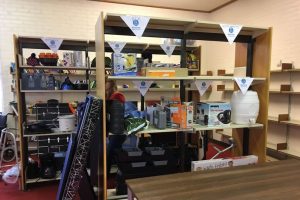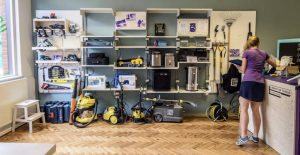The idea for Elmbridge Community Eco Hub actually came about after watching an episode of BBC series Countryfile https://www.bbc.co.uk/iplayer/episode/b0c43413/countryfile-winter-diaries-series-3-episode-2 In February 2019 they aired an episode highlighting the work being done by a group of people in Frome, Somerset (link above). The folk in Frome had set up their LOT as a community project to see if people would engage with the concept and perhaps turn it into a small business. They weren’t the first to come up with the idea – but were the first in the UK. Share shops or LOPT’s have been around in this current format for a few years – originating I believe in the Netherlands. Of course borrowing things from neighbours used to be seen as “normal” and an accepted form of community. Sadly for a lot of us though, those days are gone.
So what is a LOT? Well it’s a shop/unit/area where members of the public can borrow useful THINGS for a small fee. The THINGS can be pretty much anything that people want and perhaps don’t have room to store, money to buy outright, or skills to maintain. Hires are short term – usually a couple of days then the THINGS are returned for someone else to use. All this helps with saving useful items from going to waste, or underuse whilst encouraging trusting communities. It is hoped all items will be returned complete and in full working order.
Our plan is to open a Hub, with the LOT forming a key part. There are many different types of LOT some only lending brand new items, others lending items that have been donated, some have a very limited range of THINGS, whilst others have a huge range. I suppose the way each one is designed comes down to a few reasons.
1/ Supply and demand – what do people actually want and can you supply it to them.
2/ Your business model – are you happy lending items that have had a previous life and are now surplus to requirements, or do you want to only stock brand new items ensuring they are guaranteed.
3/ How much you want to charge – you may be able to charge more for lending a brand new item compared to one that has an “aged” look.
4/ How much space you have. If space is not an issue then you can in theory store anything from a hand drill to a speed boat! However for most LOT’s space is a premium so small, hand held items generally form the majority of Things.
So what kind of things do we envisage the Elmbridge Hub LOT stocking? A few months ago we conducted an online poll to see what sorts of things people would hire. Power tools, garden tools, small kitchen appliances, step ladders, camping gear, bicycles, party gear (such as reusable plates, cups and cutlery, portable tables and a gazebo) were the main things requested.
Our plan is to approach the community for donations and see what we receive. Anything usable will stay and be hired out, whereas items such as crockery, rigid furniture, clothing etc will be moved on to local charity shops. This way hopefully nothing is wasted.
How much will we charge and indeed why do we charge for people borrowing things, that to all intent and purpose we have been given for free? Frankly, bills need to be paid. Rent, rates, electricity, heating, water, insurance etc. And then there is the maintenance of the Things. PAT testing, repairing, cleaning, advertising etc. These all take time and cost money. To cover these costs we have to charge. Items will be available from ~ £1- £10 per day depending on the THING and duration of hire. Another way we are considering funding hires and getting things rolling is to ask for a membership fee of e.g. £50 per person per year. For this each member will be entitled to a set number of hires. This could be~ 35 hires of an item valued at £2 per hire and a significant discount of more expensive items. Clearly these figures need to be finalised and will very much depend on what we have available within the LOT. Tiered membership may also be an option £10 = 6 hires, £20 = 13, £30 = 20, £40 = 26 of certain values plus discounts. And then there will be walk in off the street fee’s without pre paid membership. So maybe you can see this single element of the Hub will be a little complex to finalise, but we will always try our best to keep the costs low and the options flexible. We may even end up designing an app so customers can pre book THINGS in advance. That may be someway down the road though.
I hope this blog goes some way to describing what we are trying to do with the Library of Things. Ultimately nits about saving people money and using items to their full potential.
It really is worth watching the Countryfile episode – link above. A quote that stands out is “an average drill is only used for 13 minutes of its usable life”! That’s crazy. That same drill could be used by many people for many hours. Just think of all those DIY projects you’ve been avoiding. No more excuses!
Here are a few photos I have copied from the Web showing how some of the UK Library of Things look. Maybe ours will look a little similar…


